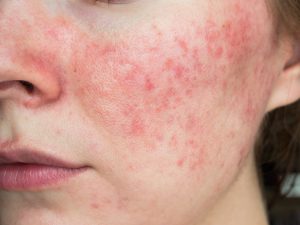
Another part of you that it’s affecting is your skin. Some dermatologists notice more patients coming in with rashes, acne, or rosacea, a skin condition that leads to redness and pimple-like bumps.
It’s possible that masks, stress, and too much pandemic-snacking are contributing. Too much sugar, for example, can promote inflammation and drive oil production that leads to acne. Over time, too much sugar can contribute to wrinkles.
Regular exercise can help with these conditions. It keeps skin cells functioning and blood moving to prevent skin aging.
Another thing you can do in your home to protect your skin is to wear sunscreen. It’s good to get outside for some natural light for a few minutes per day, but if you’re near a window all day, sunscreen may help. UV rays can come through windows and damage skin.
Being inside all the time can also contribute to dry skin, which can lead to damage. Opening windows for a little bit each day, using a humidifier, and making sure to moisturize regularly can all help.
Hygiene has also taken a hit for many during the pandemic. When you don’t wash your face or pillowcases regularly, dirt can build up and lead to blemishes and unhealthy-looking skin. Try to wash your face after waking and before bed, and clean pillowcases every week to help optimize skin health.
Keep masks clean as well. There is no real guideline to changing them, but it’s safe to say that if it’s worn for more than a couple of hours, it needs a change or wash.
Getting exercise, eating a healthy diet with lots of fruits and vegetables, using sunscreen, and practicing good hygiene can all reduce the impact of the pandemic on your skin.